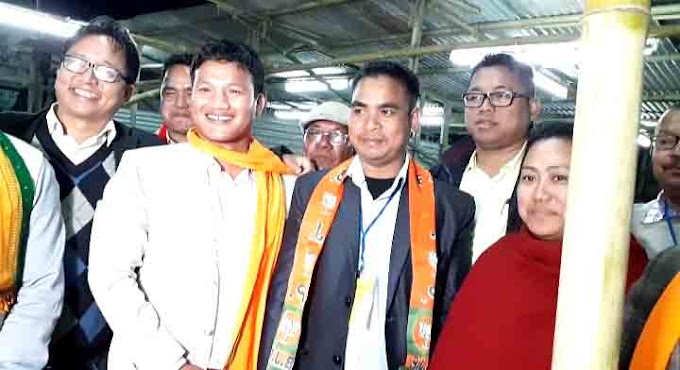The programme was organized by the Central Busu Celebration Committee 2023 comprising Mr. Kumud Kemprai as President, Mr. Pramith Sengyung as General Secretary while Chief Executive Member of NC Hills Autonomous Council Mr. Debolal Gorlosa as its Chief Patron.
The celebration programme started at with flag hoisting at 9.00 AM, followed by traditional sports like shot put, Longjump, tug-of-war, etc. Then traditional folk songs competitions was also held.
Cultural programme was organized in the evening, which began with reception of guests at 6.00 PM and opening of Baikho by the Chief Guest, followed by dance competion and flute competitions.
Dance Competition (Baidima) was organized in category wise, such as a) Malarao, b) Haingajikrao, c) Nagasarao, and d) Malasarao.
Flut Competition (Muri) was also held in category wise, like Nagarao and Haingarao.Prizes were distributed at 1.00 AM and the programme concluded with a vote of thanks by the Celebration Committe at 2.00 AM.
The actual celebration of the Busu Dima started on January 27. Since that day, the people celebrated in respected villages and area. Notable places in Haflong area were like Town Rajee, Dibarai, Digrik, Disgao Raji, Boildura, Gdain Rajee, Sambudhan Rajee, Raja Gobinda Chandra Raji, Diham Raji etc.
The central celebration on January 31 was participated by Dimasa community from all areas of the district.
‘Busu’ means the festival of eating newly-grown autumnal rice, and so it could be considered as the harvesting festival too, which mirrors the rich culture and tradition of the Dimasa community. Dimasa people observe Busu by arranging feasts and various cultural functions.
So, ‘Busu Dima’ is a post harvest festival of the Dimasa community and is considered one of the most important and biggest festivals of the community.
27th January of a calendar year is recognized as local Holiday under the administrative control of N C Hills Autonomous Council in Dima Hasao district.
Generally, ‘Busu’ is celebrated in three different ways, namely Jidab, Surem, and Hangsaomanouba. ‘Jidab’ is the simplest form of ‘Busu’. Surem is a celebration which lasts for three nights. ‘Surem’ Busu is celebrated frequently where as ‘Hangsaoinanaoba’ is celebrated occasionally as it requires large amount of money and manpower. Generally the expenses of the ‘Busu’ are borne by the villagers.
There is a custom in Dimasa community where the people collectively help others in cultivation without taking wages for the work. But they collect rice or paddy after harvesting to celebrate ‘Busu’.
When the community decides to celebrate ‘Hangsaomanaoba’, a separate plot of land is cultivated and from which the expenses for the celebration is taken. The ‘Surem Busu’ lasts for three days while the ‘Hangsaomanaoba’ lasts for seven days.
On ‘Bususataiba’, the first day of the Busu, meat is distributed to every household. In ‘Busuma’, the second day, the boys with older men sing ‘Bagaoba’, welcoming the guests. The ‘Kunang’, village headman, sings a devotional song, seeking blessings on behalf of the villagers from Lord Shiva, so that the villagers could spend the festive days with joy and merry-making. Traditional games and sports are also organized during the ‘Busu’.
The boys and girls perform dances and sing songs during these days. They beat drums named ‘Khram’, play pipes called ‘murri’, flutes’supin’ and ‘Khram dubung’. Playing of ‘murri’ should be continued from the beginning of ‘Busu’ till the last day of the festival. ‘Judima’ (Rice beer) pork, chicken, fish are enjoyed during the ‘Busu’. Thus the ‘Busu’ symbolizes the unity and coexistence among the people of Dima Hasao.






0 Comments